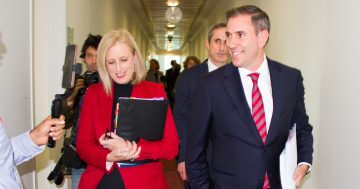
This afternoon the ACT government will deliver the 2016 budget. As there is a local election in October will it be bland, even largely forgettable, like the cautious May federal budget, precursor to the July 2 election?
Or, more likely, will our local effort be directed at appeasing the voters, softening them up for the October challenge?
If the latter approach, it is an opportunity missed, because while the federal budget was bland the electoral response with a few notable exceptions was a welcome change from the usual expectant cry of “What’s in it for me”.
Only an aberration perhaps. We have drifted without concern into what a previous federal treasurer called “the age of entitlement” and while he is long gone the unacceptable dependency remains.
Why do we make family payments irrespective of the number of children a couple has, putting pressure on other aspects of government (taxpayer) funding?
Should those who chose to live unhealthy lifestyles be picked up by the public (taxpayer) health system?
Should those in retirement who have failed to make provision for their future be dependent upon public (taxpayer) assistance?
Not everyone falls into the category of lacking responsibility for themselves and family but we have extended the generosity of the public purse too far, to the extent just about everyone is entitled and, unfortunately, too many believe so.
Politicians are responsible for this corruption, making all sorts of promises, particularly around election time. The justification is you’ve paid all your life – or are paying – taxes and are entitled to whatever is being promised, forgetting if we hadn’t been paying our way we all would be considerably worse off.
Promises often are made without knowing if people can afford to do without the gift or might want to refuse. The ACT’s MyWay transport card for retirees and the proposed free green waste bin for some elderly people are examples, even if these must be applied for. The community bus service and home maintenance scheme are other free concessions which do not appear to be mean’s tested. Why?
Welfare groups will protest at tightening benefits but it will be in their own interest because public savings could be directed to helping those in genuine need. We also may direct more funds from such adjustments to provide expensive research and equipment, often the target of well-meaning charities – an area of demand which is growing because governments seemingly cannot afford to do so.
There is no guarantee public savings would be passed on to help those in need but tightening up on hand-outs to those not socially responsible and those who do not need them would be no bad thing, a flag on increasing public largesse at the expense of real priorities.
As a so-called progressive territory it would be ground-breaking if today’s ACT budget, as an Australian first, recognises this potential for savings and social responsibility and acts within its own financial boundaries to do so, but I won’t hold my breath.





















